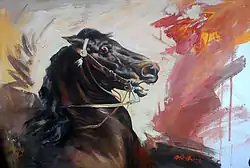zviegt
Latvian
FWOTD – 21 August 2015

Zviegt
Etymology
From Proto-Baltic *žweng-tey, *žweng-ti, from Proto-Indo-European *ǵʰweng-tey, from *ǵʰwen- “to sound, to make a sound” (whence also the borrowing zvanīt) with an extra g. Cognates include Lithuanian žvéngti “to neigh, to laugh out loud,” žviẽgti “to neigh, to squeak, to shout loud.”[1]
Pronunciation
- IPA(key): [zvìɛkt]
Verb
zviegt (intransitive, 1st conjugation, present zviedzu, zviedz, zviedz, past zviedzu)
- (only 3rd person, of horses) to neigh, to whinny (to produce a horse's typical cry)
- zirgi zviedz ― the horses are neighing
- kūtī viens pats atstāts, nemitīgi zviedza Lejassmeltēnu Jorģa ērzelis ― left alone in the barn, Lejassmeltēnu Jorgis' stallion neighed constantly
- to laugh out loud, uproariously
- tanī brīdī mani sagrāba smiekli... tas, protams, bija zemiski no manas puses, nenoliedzu... zviegt tādā brīdī ― at that moment I was overcome by laughter... this, of course, was very impolite from me, I don't deny... to laugh out loud at such a moment
- liekas, ka nekas tāds jocīgs uz skatuves nenotiktu, bet lejā it visi atkal sāk zviegt smeklos un aplaudē ― it seems that nothing funny would happen on the stage, but down below again everybody began to laugh out loud and applaud
Conjugation
conjugation of zviegt
| INDICATIVE (īstenības izteiksme) | IMPERATIVE (pavēles izteiksme) | ||||
|---|---|---|---|---|---|
| Present (tagadne) |
Past (pagātne) |
Future (nākotne) | |||
| 1st pers. sg. | es | zviedzu | zvedzu | zviegšu | — |
| 2nd pers. sg. | tu | zvedz | zvedzi | zviegsi | zvedz |
| 3rd pers. sg. | viņš, viņa | zviedz | zvedza | zviegs | lai zviedz |
| 1st pers. pl. | mēs | zviedzam | zvedzām | zviegsim | zviegsim |
| 2nd pers. pl. | jūs | zviedzat | zvedzāt | zviegsiet, zviegsit |
zvedziet |
| 3rd pers. pl. | viņi, viņas | zviedz | zvedza | zviegs | lai zviedz |
| RENARRATIVE (atstāstījuma izteiksme) | PARTICIPLES (divdabji) | ||||
| Present | zviedzot | Present Active 1 (Adj.) | zviedzošs | ||
| Past | esot zvedzis | Present Active 2 (Adv.) | zviegdams | ||
| Future | zviegšot | Present Active 3 (Adv.) | zviedzot | ||
| Imperative | lai zviedzot | Present Active 4 (Obj.) | zviedzam | ||
| CONDITIONAL (vēlējuma izteiksme) | Past Active | zvedzis | |||
| Present | zviegtu | Present Passive | — | ||
| Past | būtu zvedzis | Past Passive | — | ||
| DEBITIVE (vajadzības izteiksme) | NOMINAL FORMS | ||||
| Indicative | (būt) jāzviedz | Infinitive (nenoteiksme) | zviegt | ||
| Conjunctive 1 | esot jāzviedz | Negative Infinitive | nezviegt | ||
| Conjunctive 2 | jāzviedzot | Verbal noun | zviegšana | ||
References
- Karulis, Konstantīns (1992) “zviegt”, in Latviešu Etimoloģijas Vārdnīca (in Latvian), Rīga: AVOTS, →ISBN
This article is issued from Wiktionary. The text is licensed under Creative Commons - Attribution - Sharealike. Additional terms may apply for the media files.